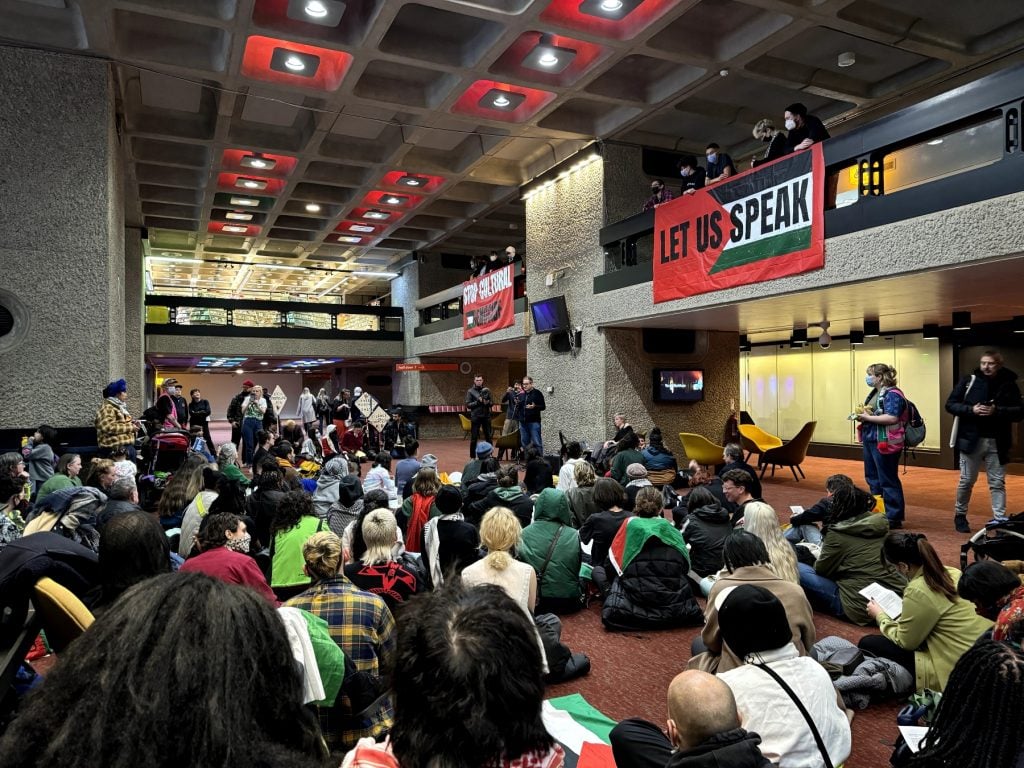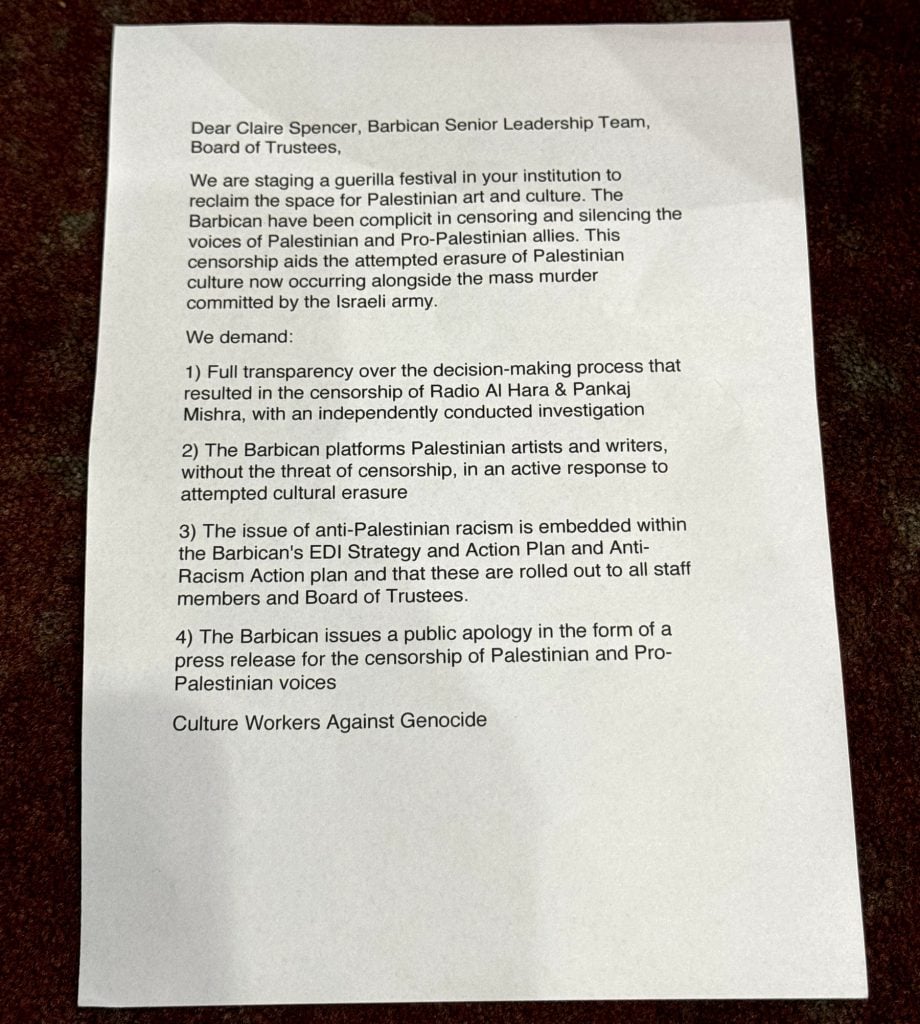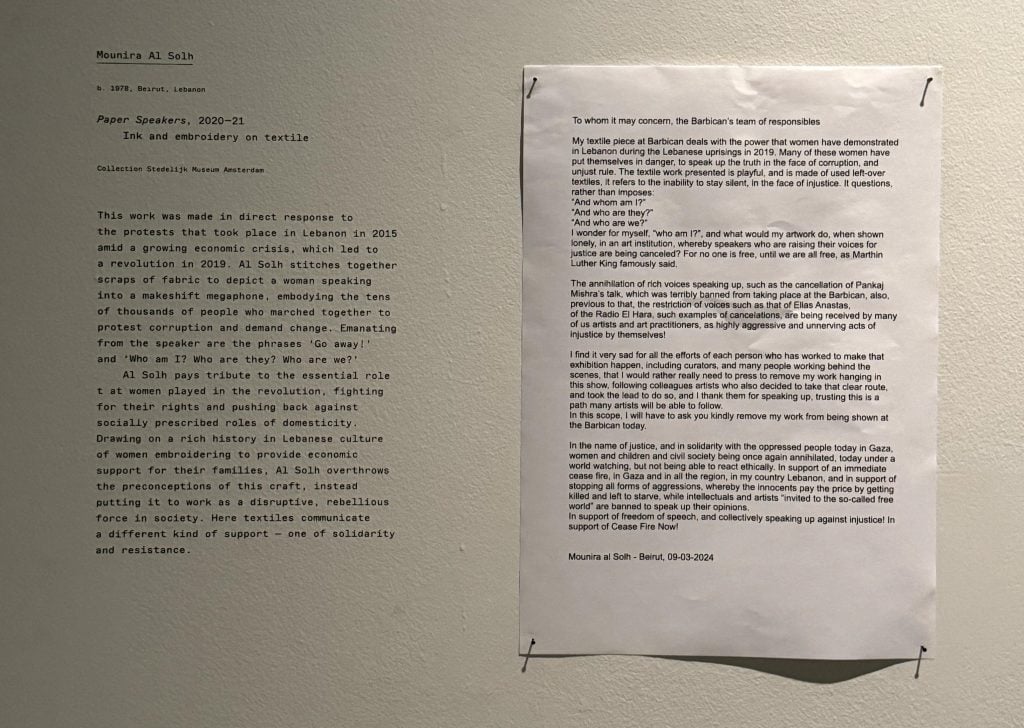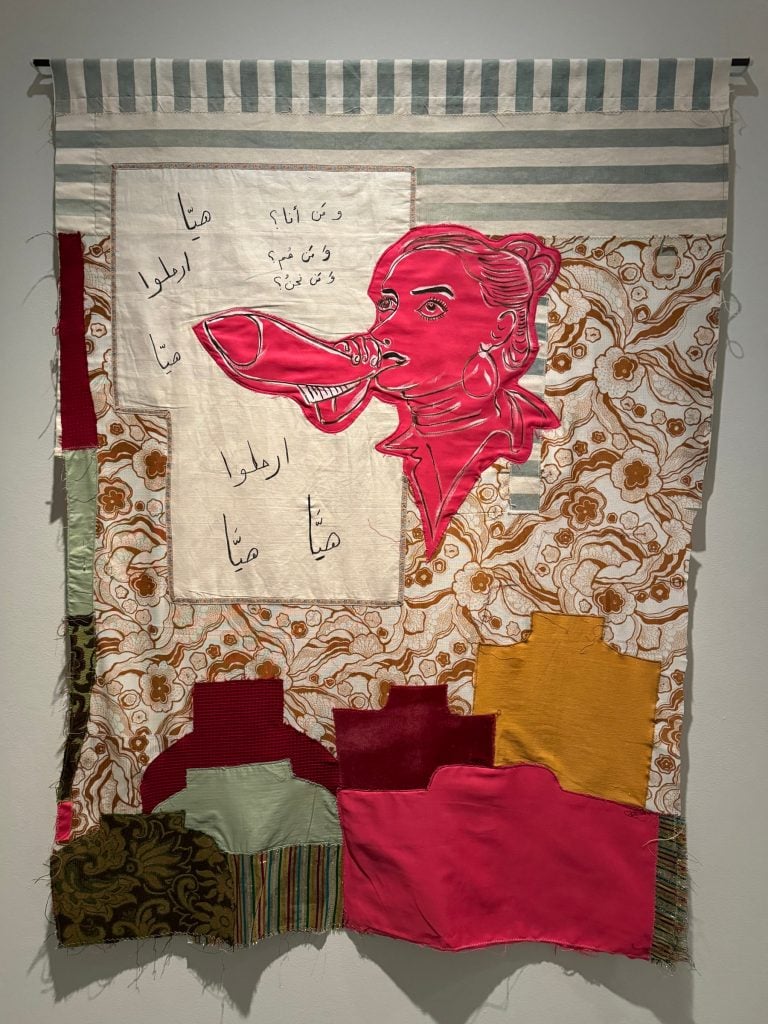Museums & Institutions
Protestors Take Over the Barbican with ‘Guerrilla’ Palestinian Art Festival
Artist Mounira al Solh has spoken out against "highly aggressive and unnerving" acts of censorship at the Barbican.

Artist Mounira al Solh has spoken out against "highly aggressive and unnerving" acts of censorship at the Barbican.

Jo Lawson-Tancred

Pro-Palestine protestors filled the foyer of the Barbican Centre in London on Saturday, March 16, for Let Us Speak, a guerrilla festival spotlighting Palestinian art. The demonstration came just a week after it was announced that multiple lenders and artists withdrew works from the Barbican’s “Unravel” exhibition in objection to the institutions alleged censorship of Indian writer Pankaj Mishra. It was organized by several groups including Culture Workers Against Genocide (CWAG), Parents for Palestine, and Artists on the Frontline.
Protestors in attendance waved banners and flags, including a large sign reading “Stop Cultural Genocide.” The “Let Us Speak” guerrilla festival included dance and theatrical performances, poetry readings, crafts, and a pop-up radio station.
A protester with CWAG said Saturday’s action was “vitally important.”
Hundreds of activists from artistsonthefrontline are occupying the renowned cultural institution, the Barbican Centre, in London. They are protesting against its censorship of Palestinian voices and its support for Israel. pic.twitter.com/RHGBFu0YaF
— PALESTINE ONLINE 🇵🇸 (@OnlinePalEng) March 16, 2024
“The Barbican has been heavily complicit but they are not alone. Throughout the culture sector, our institutions have remained silent while using their power to silence the voices of those speaking out against the genocide that is taking place,” the protestor added. “The occupation of the Barbican and the reclamation of British cultural space was an important moment to mourn the lives taken by Israel, collectively speak out against the silencing of Palestinian artists, and celebrate Palestinian culture with hundreds of participants joyfully dancing Dabke hand-in-hand. It was a statement that we will stand together and speak out against the censorship of Palestinian voices.”
Printed letters addressed to the Barbican’s CEO Clair Spencer, its senior leadership team, and board of trustees, and signed by CWAG, were dispersed at the protest on Saturday. They claimed that the festival was an action to “reclaim the space for Palestinian art and culture.” They also set out four demands, including that the Barbican Centre must platform “Palestinian artists and writers, without the threat of censorship, in an active response to attempted cultural erasure.”

Letter flier by Culture Workers Against Genocide Group. Photo courtesy of Censorship at the Barbican.
Another notice by artist Mounira al Solh has been hung in place of her work Paper Speakers (2020-21), which she requested be removed from “Unravel.” She wrote that the cancellation of Mishra’s talk and the censorship of Palestinian radio host Elias Anastas at the Barbican Centre last year was “highly aggressive and unnerving.”
Al Solh will represent Lebanon at this year’s 60th Venice Biennale.

Notice by Mounira al Solh in place of artwork at “Unravel” exhibition at Barbican Centre in London. Photo: Courtesy of Censorship at the Barbican.
Artists Diedrick Brackens, Mounira al Solh, Yto Barrada, and Cian Dayrit requested that their works to be removed from “Unravel: The Power and Politics of Textiles in Art”, as did other lenders of works by Loretta Pettway and Pacita Abad. A total of nine works have been removed.
Mishra’s lecture “The Shoah After Gaza,” organized by the London Review of Books, was scheduled to take place at the Barbican Centre until it allegedly pulled out “at a late stage.” The arts center said it did not have enough time to give the topic “dedicated and thoughtful care.”
Brackens, who requested his work fire makes some dragons (2020) removed, said he was “dismayed by the museum’s acts of censorship and refusal to hold itself accountable.”
He added: “It is disheartening that this exhibition has to be dismantled work by work in order to expose the complicity of the institution in silencing those of us who are speaking out against the historical and ongoing violence being committed in Gaza.”

Mounira al Solh, Paper Speakers (2020-21). Photo: Courtesy of Censorship at the Barbican Centre.
“We respect people’s right to express their views and protest peacefully,” the Barbican said in a statement, echoing the curatorial notes that now hang in the galleries where works have been removed.
In recent months, museums globally have frequently become sites of protest in support of Palestine, including the British Museum last month as well as the Museum of Modern Art in New York and the Yerba Buena Center for the Arts in San Francisco.